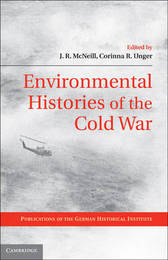
|
Environmental Histories of the Cold War
Hardback
Main Details
Description
Environmental Histories of the Cold War explores the links between the Cold War and the global environment, ranging from the environmental impacts of nuclear weapons to the political repercussions of environmentalism. Environmental change accelerated sharply during the Cold War years, and so did environmentalism as both a popular movement and a scientific preoccupation. Most Cold War history entirely overlooks this rise of environmentalism and the crescendo of environmental change. These historical subjects were not only simultaneous but also linked together in ways both straightforward and surprising. The contributors to this book present these connected issues as a global phenomenon, with chapters concerning China, the USSR, Europe, North America, Oceania, and elsewhere. The role of experts as agents and advocates of using the environment as a weapon in the Cold War or, contrastingly, of preventing environmental damage resulting from Cold War politics is also given broad attention.
Author Biography
J. R. McNeill has taught at Georgetown University since 1985 as Professor of History, as well as being holder of the Cinco Hermanos Chair in Environmental and International Affairs and University Professor. His books include The Mountains of the Mediterranean World (Cambridge University Press, 1992), Something New under the Sun (2000), The Human Web (2003), and Mosquito Empires (Cambridge University Press, 2010). Corinna R. Unger received her PhD in History from the University of Freiburg, Germany, in 2005 and joined the German Historical Institute in Washington, DC, as a research Fellow the same year. She is currently working on a study titled Modernization in Theory and Practice: American and German Aid to India, 1947-1980. Her books include Ostforschung in Westdeutschland (2007) and Reise ohne Wiederkehr (2009).
Reviews"The volume is in itself an admirable initiative, as these aspects of the cold war are often neglected." -Technology and Culture, Maja Fjaestad "One of the most important lessons to come out of this book is that we are still sorting out the political, diplomatic, and military legacies of the era, the Environmental consequences of the Cold War are still unraveling. This book is a good place to start any such investigation." -Frederic Krome, Canadian Journal of History "...provides and excellent initial offering of Cold War-environment narratives with valuable vistas into a rich and still fertile field of research." -Roger Eardley-Pryor, Journal of World History
|